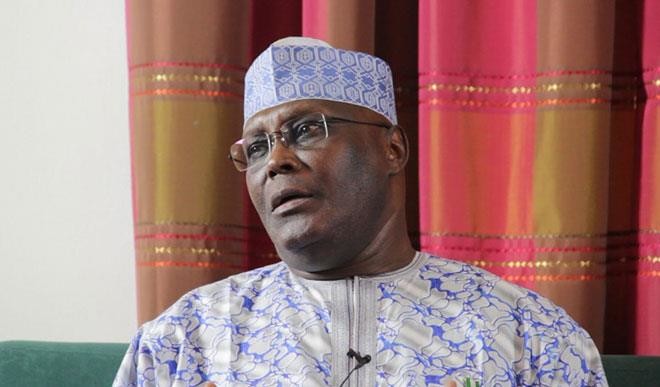
The recent announcement by former Vice President Alhaji Atiku Abubakar that he has quit the APC, and suspicions that he wants to join the PDP to bid to become the party’s flag bearer in the 2019 presidential election, has led to his critics hurling phrases like ‘serial contestant’ and ‘political prostitute’ at him and his politics.
My aim in this piece is not to defend Atiku but to interrogate what it really means to be a ‘serial contestant’ or ‘political prostitute’ in our type of environment where the political parties are not separated by any ideology or philosophy. In fact the difference between the political parties, including the APC and the PDP, I dare say, is like the difference between 12 and one dozen.
There are several observations:
One, in a sense, Nigerian political parties do not qualify to be so called in the strict sense of the word. What we have are different political tendencies that are built around individuals and their ambitions. In other words, the constant alignment and re-alignment within political parties are not different from changing from one political party to another. Politicians, in an environment like ours where politics generally (not just among the political parties) is not driven by any ideology or philosophy, will be the first to tell you that “there are no permanent friends in politics, but only permanent interests”. Is it not ironic that Atiku who started the process that made Jonathan lose the 2015 election by staging a walkout on the PDP convention is today believed to have the support of the former President to be the PDP’s flag-bearer? For them, whatever transpired was not personal, just politics. This is precisely why I sometimes sympathize with people who put their lives on the line in the intra-dog fight for power and privileges among the political class.
Two, there is no difference among our politicians when it comes to hopping from one party to another or moving from one political alignment to another within the same party. Take for instance Buhari, who is regarded as the epitome of integrity by his supporters. He contested for the presidency on the platform of the ANPP in 2003 and 2007 and then formed his own party the CPC in 2011. In 2015 he contested again under the APC (a fusion of a number of parties that included his own CPC). It is interesting that while Buhari contested for the presidency of the country four times under three different political parties, it is Atiku who has actually contested for the presidency of the country only once (in 2007 when he ran under the defunct Action Congress) that is branded a ‘political prostitute’. True, Atiku contested unsuccessfully to be the flag bearer of his party twice (in 1993 against Abiola and in 2010 against Jonathan). But are these really enough to make him a ‘serial contestant’ or ‘political prostitute’? I feel that because of his known political ambition, (which he sometimes does not manage as well as he should), the number of times he actually contested for the presidency of this country or to be the flag bearer of his party is often exaggerated in the public imagination.
Three, while we pretend to be nauseated with politicians who hop from one political party to another on a whim, we often assume wrongly that the society will reward those who remain loyal to their party – irrespective of the changing circumstances of that party. For instance, Dr Ogbonna Onu, the current Minister of Science and Technology remained faithful to the ANPP until its merger with others to form the APC. How has the larger society rewarded him for that loyalty? Certainly in our type of environment, it remains debatable whether people see his sticking with ANPP (even when the party was shrinking) as evidence of principle or lack of ambition.
Four, the lack of overarching philosophy that drives politics and political parties and the consequent hopping of politicians from one political alignment to another within their parties or from one political party to another, is a reflection of what happens in the larger society. Within a span of a few years, an average Nigerian business man will have tried his hand on several businesses, failing in many; the average Emeka, Segun or Adamu will have tried to work in a number of jobs; several will have moved residencies, including relocating abroad (or trying to do so). While people justify these vertical and horizontal movements by arguing that Nigeria is in a state of flux and that people have no choice but to negotiate and navigate their survival within the system, they are quick to condemn politicians who behave exactly as they do. We should look at ourselves in the mirror! This was the message of the late pop icon Michael Jackson in his 1987 hit song ‘Man in the Mirror’. While it is OK to extol our octopus-like movements in search of greener pastures, it is fun to deride politicians who do exactly what we do.
Five, there are several dimensions of integrity and no person has ‘integrity’ in all facets of his or her life. This is why people often caution against judging the weather only by its inclement side. A similar aphorism by the American writer and historian James Truslow Adams also warns us: “There is so much good in the worst of us, and so much bad in the best of us, that it ill behoves any of us to find fault with the rest of us.” This is also a warning against any tendency to look at things in zero-sum terms. For instance Atiku has ‘only’ a Diploma in Law from Ahmadu Bello University but his American University in Yola is perhaps one of the best private Universities in the country. How many Nigerians in Atiku’s shoes will resist the temptation of registering in that University (or even in any University in Nigeria), and ‘graduating’ with First Class honours – and perhaps going ahead to obtain Master’s and Doctorate degrees? Is this not a rare demonstration of integrity?
Six, it will also be interesting to interrogate at what point ambition becomes inordinate. Abraham Lincoln, the 16th President of the USA, is usually used to extol the virtues of doggedness and not giving up amid failures and unwanted outcomes. Lincoln, who failed in business in 1831, was defeated when he ran to become a State legislator the following year; in 1843, he ran again for Congress and was defeated; he ran again in 1848 and was once more defeated. But he never gave up. In 1855, he ran for Senate and lost; he ran for Vice President in 1856 and also lost; when he ran for the Senate in 1859 the outcome was the same failure. But in 1860, his doggedness paid off as God turned to his page and he was elected President of the United States. Why do we use Lincoln to teach people about the virtues of not giving up and deride Atiku because he ran unsuccessfully for President once and tried unsuccessfully two or so times to become the flag bearer of his party?
This is the same sort of double standard we have when it comes to fighting corruption. Everyone seems to be fighting against corruption that I often wonder who are left to perpetrate the corruption in the society. Even the roadside car mechanic who will swap the new battery in your car for his old one if you step out of sight, gets very angry when he talks about the corruption in the society
Seven, a larger question raised by the above reflection is our leadership recruitment process and what we should be looking for in our potential leaders. I feel that since we constantly complain about the quality of leaders we get, we should also ask ourselves whether the qualities we extol or condemn during the leadership recruitment process actually correlate with what we expect those leaders to accomplish in office.
Let me give a simple test here by posing two hypothestical questions: Question 1: Assuming you are given a choice between someone you know is corrupt but has the capacity to govern well and someone you know lacks the capacity to deliver but is not corrupt, who will you choose?
Question 2: Assuming you are given a choice between a politician who is a ‘political prostitute’ (as all our politicians are) but is known to have the capacity to take the country to the next level, will you prefer the man who has remained loyal to only one party but has no proven capacity to deliver?
Let me underline that I am not extolling party hopping or corruption. My point is that the qualities we extol or condemn as we search for our leaders should have relevance to such leaders’ ability to govern effectively.

 Join Daily Trust WhatsApp Community For Quick Access To News and Happenings Around You.
Join Daily Trust WhatsApp Community For Quick Access To News and Happenings Around You.


